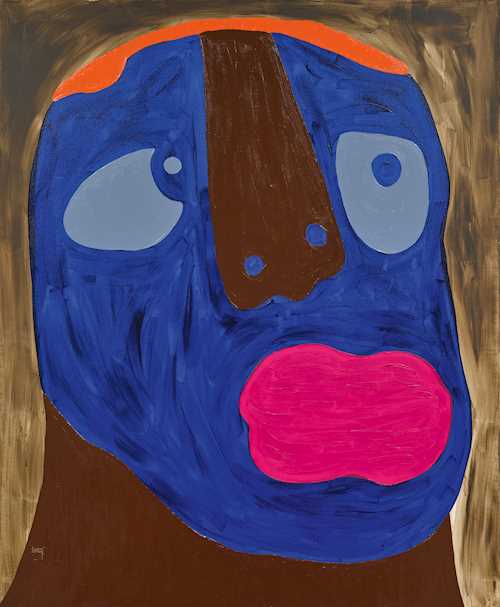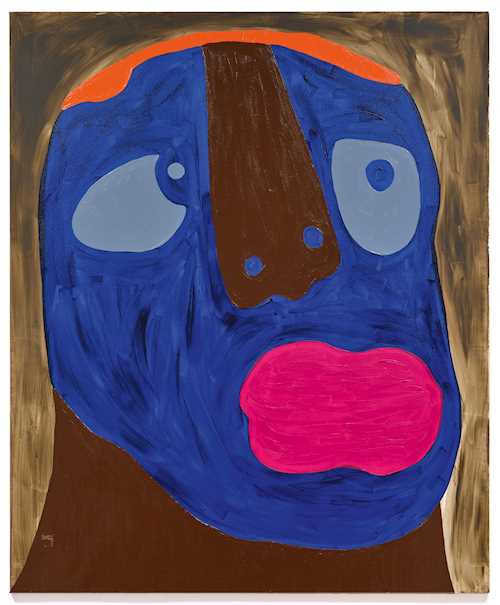
Lot 3464* - A205 PostWar & Contemporary - Thursday, 22. June 2023, 02.00 PM
ISSHAQ ISMAIL
(Accra 1989–lives and works in Accra)
Aziz. 2019.
Acrylic on canvas.
Signed lower left: Isshaq.
153 × 126 cm.
With the certificate by the Isshaq Ismail Studio, Accra, Ghana.
Provenance:
- Artist's studio.
- Purchased directly from the artist by the present owner, since then private collection Austria.
Isshaq Ismail was born in Accra in 1989 and is now part of Ghana's flourishing and influential art scene. He has gained international fame for his "grotesque portraits".
The large-format painting offered here, "Aziz" from 2021, is dominated by a distorted face. A huge red mouth and an equally large brown nose with blue nostrils protrude from the blue face. Large eyes, differently shaped and looking in different directions, peer out of the painting. With quick, gestural brushstrokes, a strong colour palette and the impasto application of paint, the artist has brought his portrait to life.
Through both form and colour the "inhuman portraits" are brought into being, and for Isshaq Ismail they are the reflection of an equally inhuman society. By means of the grotesque, he expresses emotions and moods that prevail in a social, cultural, and political present filled with fear. In this environment, many people are unable to express their worries and fears in words, and it is precisely these people that he gives voice to with his impressive portraits. His paintings are sometimes based on sketches from photographs but are mostly based on sketches that draw on his memories and experiences from the streets, public places, and public transport of the metropolis of Accra.
His paintings are characterised by a range of emotions - fear, worry, discontent, insecurity, discrimination, desolation, etc. Beyond that, however, the artist refrains from any attribution: the colour palette he uses means that skin colour plays no role (he never uses brown or white for faces), the abstraction and the framing of the picture mean that neither gender nor age can be determined, and the distortions mean that no specific person can be identified. He does not paint real people, but rather personified images of the underlying emotions. This anonymisation lends his oeuvre a universal quality. Nevertheless, he insightfully presents to the viewer identities which have been shattered by fears, caused by judgements about appearance, by material aspirations, by racial or gender oppression.
While studying at the Ghanatta College of Art and Design, he became familiar with the works of Jean-Michel Basquiat and Francis Bacon. This encounter with their works helped him to break away from convention and the veneration of given forms, materials, and styles and to develop his own "grotesque" visual language.
Provenance:
- Artist's studio.
- Purchased directly from the artist by the present owner, since then private collection Austria.
Isshaq Ismail was born in Accra in 1989 and is now part of Ghana's flourishing and influential art scene. He has gained international fame for his "grotesque portraits".
The large-format painting offered here, "Aziz" from 2021, is dominated by a distorted face. A huge red mouth and an equally large brown nose with blue nostrils protrude from the blue face. Large eyes, differently shaped and looking in different directions, peer out of the painting. With quick, gestural brushstrokes, a strong colour palette and the impasto application of paint, the artist has brought his portrait to life.
Through both form and colour the "inhuman portraits" are brought into being, and for Isshaq Ismail they are the reflection of an equally inhuman society. By means of the grotesque, he expresses emotions and moods that prevail in a social, cultural, and political present filled with fear. In this environment, many people are unable to express their worries and fears in words, and it is precisely these people that he gives voice to with his impressive portraits. His paintings are sometimes based on sketches from photographs but are mostly based on sketches that draw on his memories and experiences from the streets, public places, and public transport of the metropolis of Accra.
His paintings are characterised by a range of emotions - fear, worry, discontent, insecurity, discrimination, desolation, etc. Beyond that, however, the artist refrains from any attribution: the colour palette he uses means that skin colour plays no role (he never uses brown or white for faces), the abstraction and the framing of the picture mean that neither gender nor age can be determined, and the distortions mean that no specific person can be identified. He does not paint real people, but rather personified images of the underlying emotions. This anonymisation lends his oeuvre a universal quality. Nevertheless, he insightfully presents to the viewer identities which have been shattered by fears, caused by judgements about appearance, by material aspirations, by racial or gender oppression.
While studying at the Ghanatta College of Art and Design, he became familiar with the works of Jean-Michel Basquiat and Francis Bacon. This encounter with their works helped him to break away from convention and the veneration of given forms, materials, and styles and to develop his own "grotesque" visual language.
CHF 10 000 / 15 000 | (€ 10 310 / 15 460)
Sold for CHF 13 720 (including buyer’s premium)
All information is subject to change.

